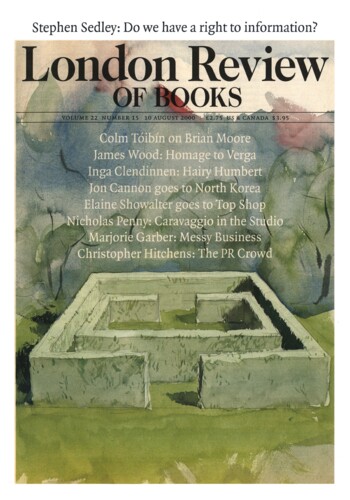By now everyone must know the deal: if 75 per cent of people who download the monthly installments of Stephen King’s ‘new’ online novel, The Plant, pay for it, he’ll keep on churning it out. Addressing visitors to his website as ‘my friends’, he urges them to ‘Remember: Pay and the story rolls. Steal and the story folds. No stealing from the blind newsboy!’ Since the man’s sight is rapidly failing him, the last sentence has its own macabre twist – ‘vintage King’, as the pundits might say. Cynics might reply that King is in fact banking on only, say, 60 per cent of his readers forking out. He wrote the first three episodes back in the early 1980s (he nonchalantly makes a virtue out of the epistolary story being ‘set ... before e-mail ... when even the fax was a fringe technology’). As long as fewer than three quarters of readers cough up, he’ll have effortlessly, even wordlessly fulfilled his promise to his fans that they’d have something new this summer – he took a sabbatical following a nasty road accident – while earning at least a few dollars, one per honest reader per pre-prepared episode. Money for old rope, to buy King more time.
Those less famous than King who fancy getting published online can apply to author-direct.co.uk, a new website launched at the Hay-on-Wye festival in May. It goes live some time this month. Laurence Middleton Jones, the company’s managing director, believes he is in a position to find ‘tomorrow’s writers today’, while at the same time describing electronic publishing as a ‘refreshing step into the past’. Now there’s an arresting paradox, although it makes you wonder whether the discovery of many of today’s writers might not have been better left till tomorrow. Middleton Jones ‘explained’ that ‘Tristram Shandy, written today, would have little chance of finding a publisher. e.publishing’ – note the chic typography – ‘gives the opportunity to promote a wider range of styles including experimental works.’ It’s hard to imagine authordirect producing a more ‘experimental’ novel than Mark Danielewski’s House of Leaves (Anchor, £13), published on paper to great acclaim on both sides of the Atlantic. Bret Easton Ellis has said that ‘it renders most other fiction meaningless. One can imagine Pynchon and Ballard and Stephen King and David Foster Wallace bowing at Mark Danielewski’s feet, choking with astonishment, surprise, laughter and awe. I feel privileged to be among its first readers. Will I ever recover?’ House of leaves has at least three narrative strands, with at least as many fonts, text running in at least as many directions and footnotes to footnotes to footnotes that make the Dunciad look clean. It weighs in at around eight hundred pages, and the helplessly sceptical might think Easton Ellis’s exorbitant praise was given in exchange for not having read the book from beginning to end, if that’s the right direction to read it in. Experimental or otherwise, authordirect promise to publish ‘literature’, which means ‘fiction, poetry and plays’ – the last of which are, I suppose, to be performed by virtual actors in cyberspace.
There are two obvious reasons to publish a work of fiction: you think it has some literary value, or you think it will make money. A decent publisher should have a list which between all its titles manages to fulfil both criteria; some remarkable novels fulfil both on their own. Most contemporary fiction, on the other hand, is no good and doesn’t sell much either, but unless you’re clairvoyant it’s worth publishing a bunch of new writers each year to spread your bets. It’s pointless, however, to publish something simply because it’s been written, though a lot of debut novelists would appear to disagree. Which is where the Internet comes in so handy: anyone who feels compelled to write a novel can also ‘publish’ it themselves on the Web. Just so long as they don’t expect everyone else to read it. authordirect claim they’ll also ‘enable many more writers to earn a living from their work’, but if anyone makes serious money by writing e.fiction I’ll eat my modem.
Send Letters To:
The Editor
London Review of Books,
28 Little Russell Street
London, WC1A 2HN
letters@lrb.co.uk
Please include name, address, and a telephone number.

